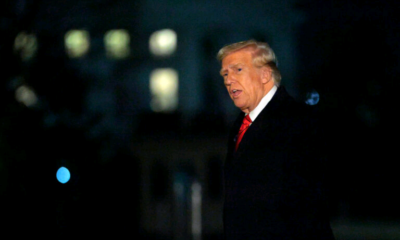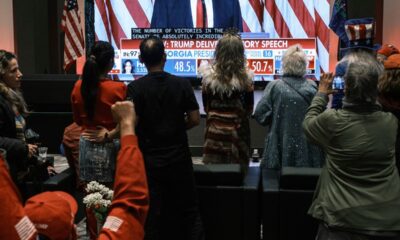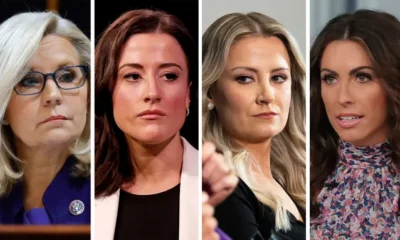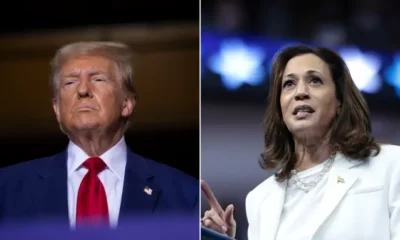NEWS
Exclusive:The Fbi Has Obtained A Recording Of The 911 Call To Assassinate Trump Following A Public Records Lawsuit. Leak Confirms Kamala Harris Hired A Hitman With …
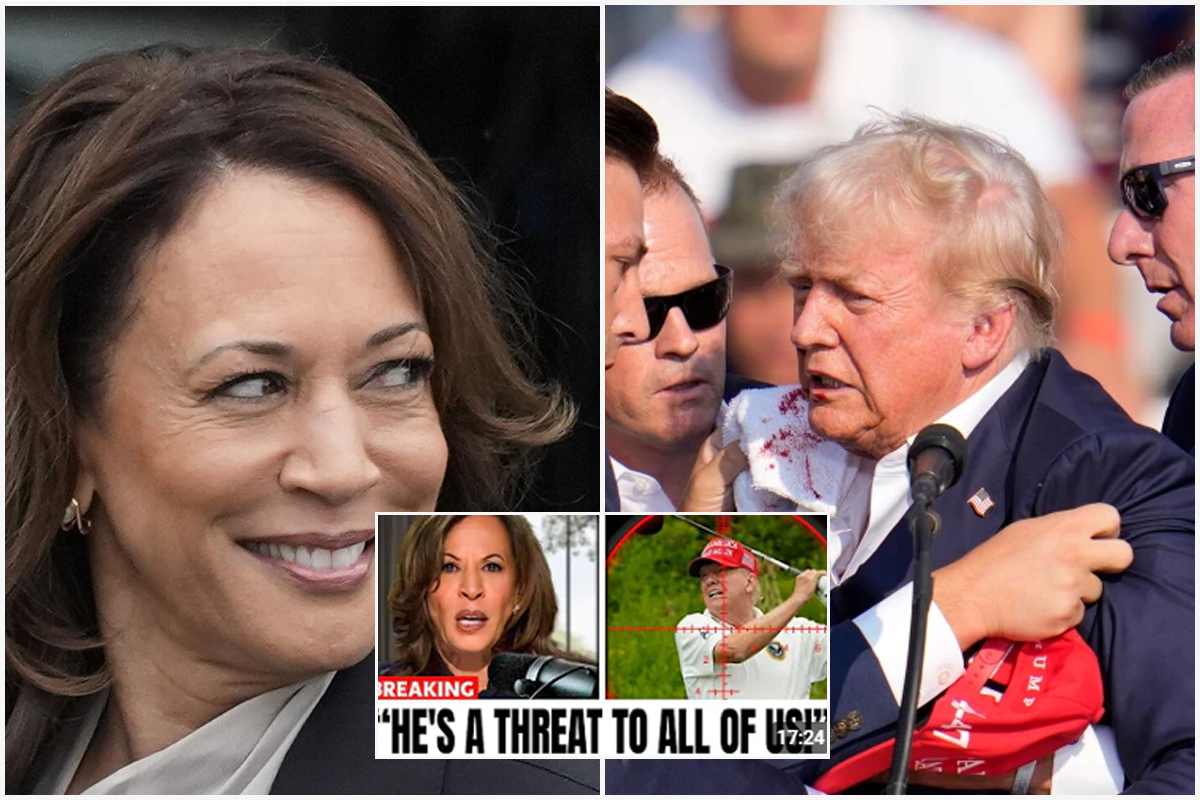
The first batch of 911 calls from the July 13 assassination attempt against former President Donald Trump at his rally in Butler, Pennsylvania, was released on Wednesday.
NBC News obtained 15 recordings from the Trump assassination attempt 911 calls following a lawsuit for public records. The 15 recordings are from 911 phone calls made between 6:12 p.m. and 6:47 p.m. on July 13.
The first 911 call, which was made at 6:12 p.m., features a woman telling a 911 operator, “Gunshots at the Trump rally. Gunshots-” before being interrupted by the operator, who assured the woman, “Yep, the police are on their way there.” The woman can then be heard telling the operator, “Better get here quick.”
NBC News reported that after the first emergency call, the 911 center received multiple calls over the next 35 minutes. The recordings of the calls reveal the panic of the rally attendees who witnessed Thomas Matthew Crooks attempt to assassinate the former president.
Shortly after the first 911 call, another woman called, saying, “We’re at the Trump assembly and there’s a guy shooting. He’s been shooting up the place.” Asked if anyone was hurt at the rally, the woman said, “No, no one’s injured. But I’m scared.”
In another recording of a 911 phone call, a woman said that her husband had been shot at the Trump rally. “Paramedics serviced him,” she told the 911 operator. “I called Butler Hospital. He’s not there. They told me to call 911.”
NBC News reported that some of the 911 phone calls were made from places outside of Butler, Pennsylvania, and included adult children who expressed concern for their parents at the rally. A North Carolina man told a 911 operator that his mother, who was at the rally, had contacted him. He said, “She called me saying there’s an active shooter on the ground there.”
Another emergency call, which was transferred to the Butler 911 center from another jurisdiction, featured a woman who said her mother had called her from the rally. She told the operator, “A bunch of people are on the ground and she’s like screaming–” before the operator answered, “Yep, the police are there, they’re taking care of the situation.”
After the woman asked what she was “supposed to do,” the 911 operator said, “The police are taking care of the situation there. If she’s able to evacuate the area there, the police are going to start getting people out of there.”
Asif Merchant was arrested on July 12. He had just loaded his luggage into his ride to the airport, commencing a journey either to his wife and children in Iran or to a different wife and children in his native Pakistan. In weeks of secretly recorded conversations with a federal informant, Merchant had confided that he had families in both countries. He also, according to an FBI affidavit, said he had come to America to arrange the assassination of “a political person.”
The identity of that person was not explicitly stated, either by Merchant or by his handler in Iran’s Islamic Revolutionary Guard Corps, according to a leaked document that was posted online by U.S. Sen. Charles Grassley on Sept. 5 after, the Iowa Republican said, it was provided to him by a whistleblower. But, along with other evidence, the documents all but confirm that Donald Trump was the person Merchant was authorized to offer up to $1 million to kill.
In the leaked document, Merchant described remotely scouting a Trump rally, then sending a written report on event security—how many guards, how many body scanners—back to Tehran. In secretly recorded meetings described by the FBI after his arrest, Merchant “games out the assassination” with the informant. The plan he details involved a crowd, a staged demonstration intended to serve as a distraction, a target at a podium, and “security all around.” Alerted to the Iranian plot well before Merchant’s arrest, the Secret Service increased protection of Trump—context that only amplified the agency’s failure when an assassin’s bullet grazed the former President at a campaign rally in Butler, Pa., on July 13.
An image of Asif Merchant, contained in the sworn affidavit supporting his July 12 arrest.Justice Department/AP
Federal authorities say they have found no evidence that the slain shooter, Thomas Matthew Crooks, acted with the assistance of anyone else, let alone Iran. Nor has any evidence emerged connecting Iran to Ryan Wesley Routh, who was apprehended after the attempted ambush of Trump earlier this month on a golf course in Florida—though Routh displayed sympathetic interest in Iran. In a self-published 2023 book about Ukraine, he mentions Iran dozens of times, and states that he repeatedly attempted to obtain a visa “to join my Iranian friends in Iran” and protest U.S. sanctions on its government. In a passage expressing regret for voting for Trump, Routh addresses Tehran directly: “You are free to assassinate Trump as well as me for that error in judgment and the dismantling of the [nuclear] deal. No one here in the U.S. seems to have the balls to put natural selection to work, or even unnatural selection.”
Prosecutors made note of the passage in a Sept. 23 court filing, in which they also singled out a reference to Iran in a “Dear World” letter Routh had left behind, explaining his reasons for trying to kill Trump. “The handwritten letter above goes on to state in part: “He [the former President] ended relations with Iran like a child and now the Middle East has unraveled.”
Every aspect of Routh’s peculiar life is under scrutiny, from the vainglorious social media postings, to his quixotic trip to Ukraine, where he wanted to bring Afghan anti-Taliban fighters who had been living as refugees in Iran.
Merchant’s arrest, by contrast, has drawn relatively little attention. Of the three assassination plots exposed in as many months, it is the only one detected in advance, and described in detail by a U.S. government already acutely aware of the threat. Iran’s leaders have been vowing to kill Trump for years, since he ordered the January 2020 death of Gen. Qasem Soleimani. The documents released after Merchant’s arrest tell a story of how serious that vow has proved to be.
To the U.S., Soleimani was an enemy, the chief of Iranian operations outside Iran—a portfolio that takes in Hamas, Hezbollah, Syria, and the Houthis. By sending particularly lethal IEDs into Iraq, he was responsible for the deaths of hundreds of Americans. But inside Iran, Soleimani was the most popular figure in an unpopular regime, described as “James Bond, Erwin Rommel and Lady Gaga rolled into one,” and “like a son” to Iran’s Supreme Leader. After his assassination by a drone strike, the Islamic Republic singled out Trump and every U.S. official involved for “justice.”
The threat was sincere. Iran maintains a state apparatus expressly dedicated to assassinating perceived enemies overseas. For most of the last 45 years, it was used chiefly to kill Iranian dissidents who reside abroad. After Soleimani’s death, however, Tehran directed its assassins to murder some of the most prominent political figures in America—a remarkable shift that carries the potential to throw U.S. politics into crisis.
Merchant, according to the leaked document, “understood that the killing was related to Iran’s retaliation for the death of Qasem Soleimani.”
Little is known of Merchant’s life beyond his Pakistani nationality, and that he traveled frequently from Pakistan to Iran. After the news of his arrest, an Indian news site wrote that he had grown up in a wealthy Karachi family, and controlled a $70 million portfolio. But according to the leaked document—a proffer, or summary of information a suspect offers while negotiating for leniency—he told the FBI that he got involved with IRGC for the money. This April, he flew to Texas, where he appears to have family, then on June 3 on to New York, where he was met at LaGuardia airport by the person who would turn out to be the informant. In a Long Island hotel, according to the publicly filed arrest affidavit, Merchant announced that their partnership would not be in clothing imports but assassination, which he illustrated by making a “finger gun.”

